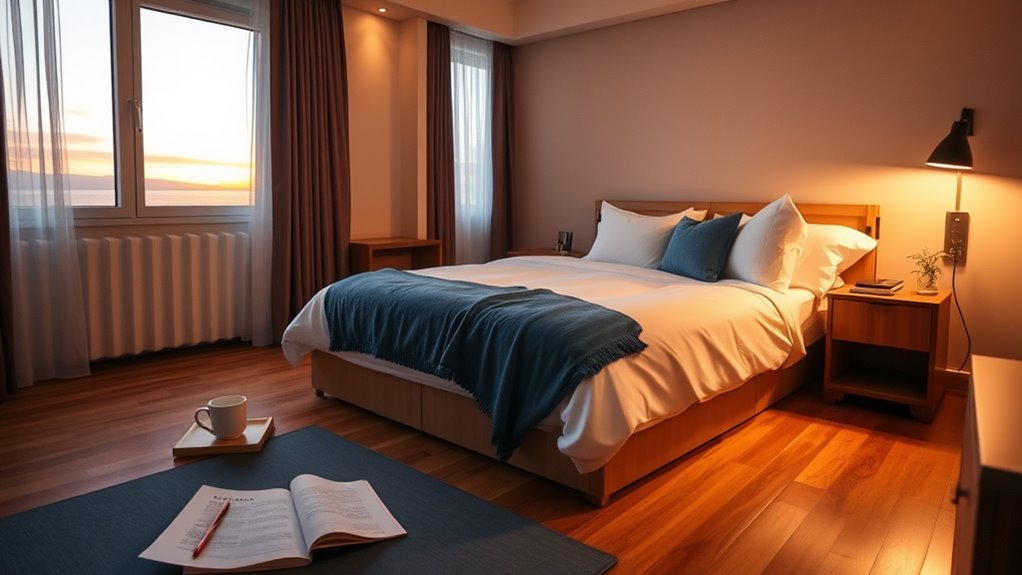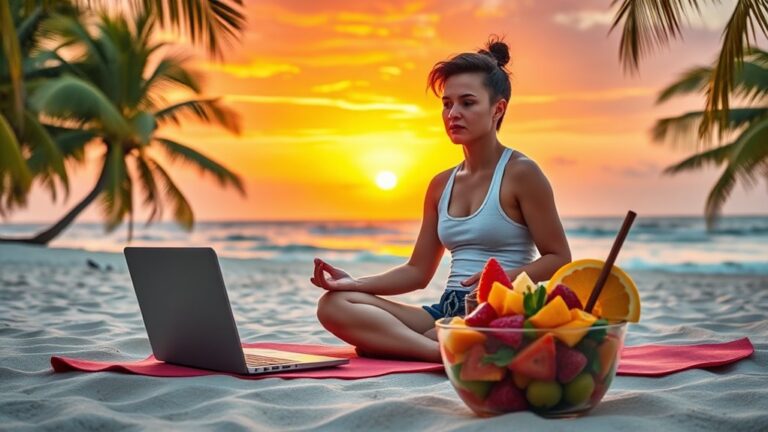To get better sleep while traveling for faster fat loss, choose accommodations that prioritize comfort and quiet. Stick to a consistent sleep schedule and create a relaxing pre-sleep routine to unwind. Optimize your sleep environment with blackout curtains and white noise. Limit caffeine and alcohol, and stay active during the day to boost your energy. Managing jet lag is essential, too. There's plenty more to discover about enhancing your sleep while on the go.
Nomad Highlights
- Prioritize accommodations with quiet environments and comfortable furnishings to enhance relaxation and promote better sleep quality.
- Maintain a consistent sleep schedule aligned with your usual routine to regulate your body's internal clock.
- Limit caffeine and alcohol intake, especially before bedtime, to avoid sleep disruption and support recovery during your travels.
- Engage in physical activity during the day to boost energy levels and enhance sleep quality, aiding in fat loss.
- Create a calming pre-sleep routine with relaxation techniques, such as deep breathing or guided meditation, to unwind before bed.
Choose the Right Accommodation
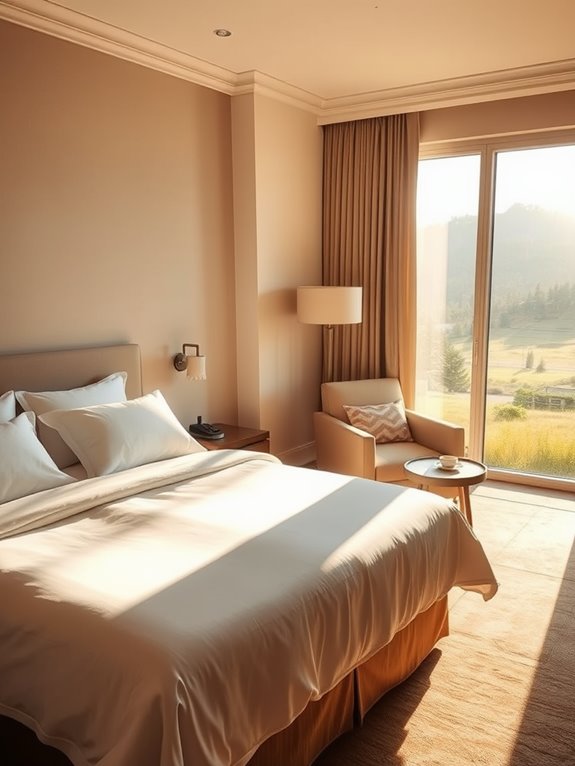
When you're traveling, choosing the right accommodation can make all the difference in your sleep quality. Look for a place that suits your needs—whether it's a cozy hotel, a quiet Airbnb, or a peaceful hostel.
Pay attention to location; try to find somewhere away from nightlife or busy streets. Check reviews for mentions of noise levels and comfort. Make sure your room has good blackout curtains to keep out light, and don't forget to take into account the mattress quality. Additionally, consider finding accommodations that have quiet environments to ensure a restful night's sleep. Research shows that sleep quality can significantly impact overall well-being and productivity during travel. Staying in a place with comfortable furnishings can also enhance your relaxation while you rest. Prioritize accommodations that feature breathable materials, as they can contribute to a more comfortable sleeping environment.
Consider the location of your accommodation, prioritize quiet areas, and ensure your room has blackout curtains and a comfortable mattress for restful sleep.
If you're sensitive to allergens, confirm the room's cleanliness and ventilation. Finally, think about amenities like Wi-Fi or breakfast options, which can enhance your stay. Additionally, consider bringing a memory foam travel pillow to help improve your neck support and overall comfort during your travels.
Prioritizing these factors will help you catch those much-needed z's while you're away.
Stick to a Sleep Schedule
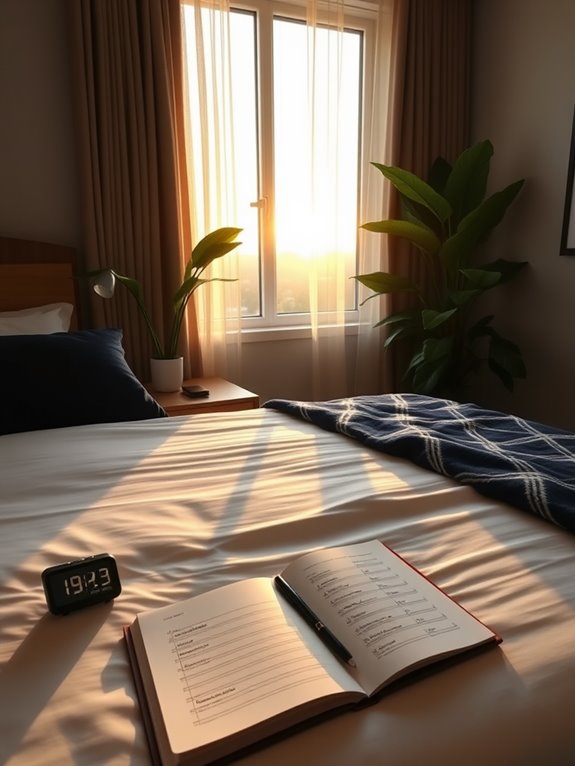
Choosing the right accommodation sets the stage for better sleep, but maintaining a consistent sleep schedule is equally important.
When you travel, it's easy to get caught up in new experiences and lose track of your regular routine. Set a bedtime and wake-up time that aligns with your usual schedule, even if you're in a different time zone. Fitness trackers can help you monitor your sleep patterns and make adjustments as needed. Try to stick to this routine as closely as possible, as it helps regulate your body's internal clock. If you can, avoid late-night activities that might interfere with your sleep. Additionally, consider using a fitness tracker to monitor your sleep patterns and ensure you're getting the rest you need, especially when adapting to new environments. Devices like the Fitbit Inspire 3 offer personalized sleep profiles that can help you track your sleep quality and make informed adjustments. Incorporating a routine that includes ankle resistance bands can also enhance your physical activity throughout the day, promoting better overall health and sleep quality. Using a tracker with advanced sleep monitoring features can provide insights into sleep quality and disturbances, leading to improved rest during your travels.
Create a Relaxing Pre-Sleep Routine
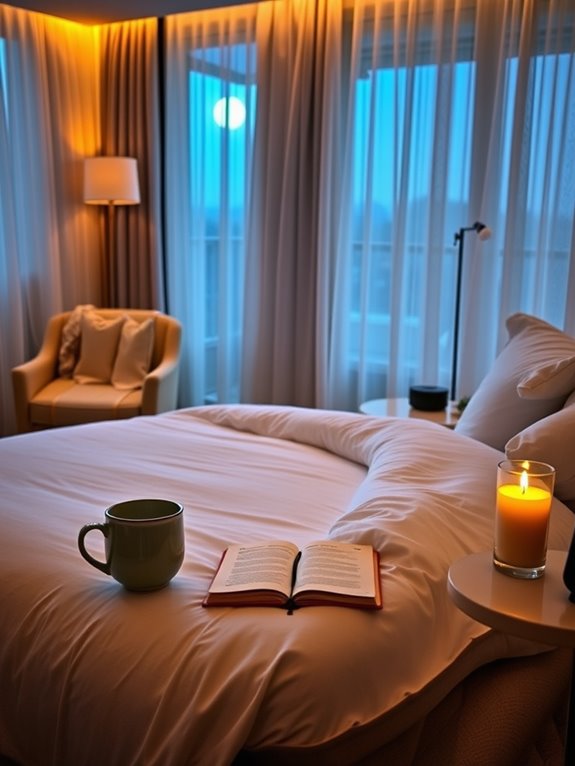
To guarantee a restful night's sleep while traveling, it's essential to create a relaxing pre-sleep routine.
Start winding down at least an hour before bed. This means turning off electronic devices, as their blue light can disrupt your sleep cycle. Instead, consider reading a book, journaling, or practicing deep breathing exercises. These activities help signal to your body that it's time to relax.
Winding down an hour before bed without screens can enhance relaxation and improve sleep quality.
You might also want to enjoy a warm beverage, like herbal tea, to soothe your mind. Chamomile and peppermint are known for their calming effects, making them excellent choices for promoting relaxation before bedtime. Stretching or doing light yoga can further ease tension.
Consistency is key, so try to stick to this routine throughout your trip. By prioritizing relaxation, you'll improve your sleep quality, ultimately supporting your fat loss goals.
Optimize Your Sleep Environment
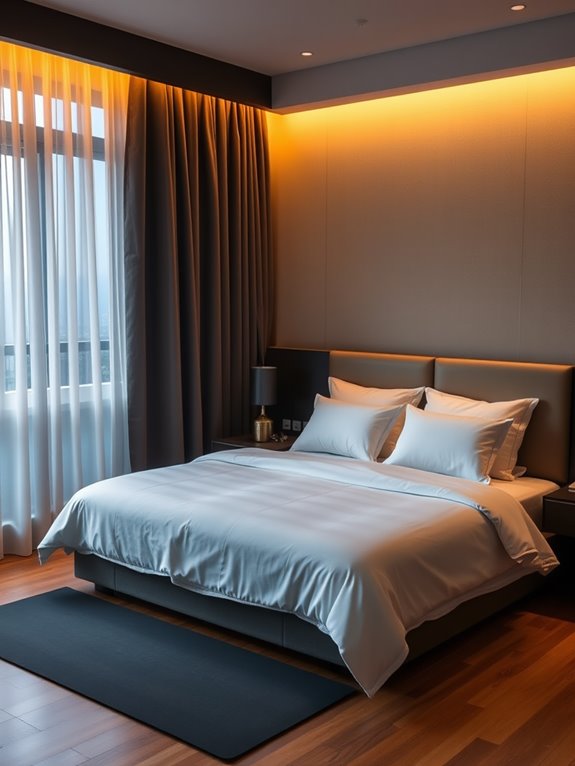
Although traveling often means dealing with unfamiliar surroundings, optimizing your sleep environment can greatly enhance your rest.
Focus on making your space as comfortable as possible to improve sleep quality. Here are three key elements to evaluate:
- Darkness: Use blackout curtains or an eye mask to block out light. Darkness signals your body that it's time to sleep. Consider using a sleep mask with effective light-blocking capabilities to ensure complete darkness. Additionally, maintaining a clean environment can help reduce allergens that disrupt sleep. Incorporating tools like a UV sanitizing wand can help eliminate germs in your space, promoting a healthier sleep environment. Furthermore, utilizing a portable sound therapy device can create a calming atmosphere to enhance relaxation.
- Noise Control: Invest in earplugs or a white noise app to drown out disruptive sounds. A quiet space helps you drift off more easily.
- Temperature: Keep your room cool, ideally between 60-67°F (15-19°C). A cooler environment promotes deeper sleep. Additionally, consider using relaxation eye pillows to provide gentle pressure and block out light, enhancing your overall sleep experience.
Limit Caffeine and Alcohol Intake
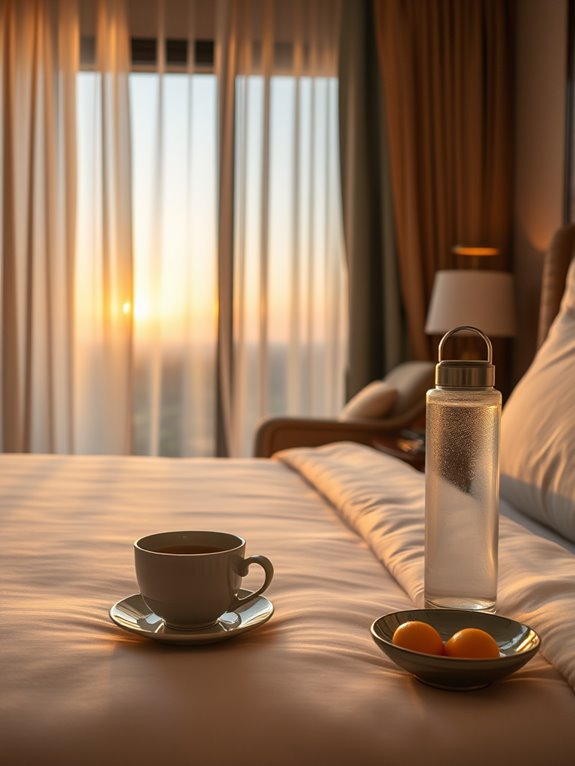
When you're traveling, it's easy to reach for that cup of coffee or a drink to unwind, but both can mess with your sleep quality. Timing your consumption is key to ensuring you get the rest you need. Consider healthier alternatives that can help you relax without disrupting your sleep. For instance, incorporating calming essential oil blends into your routine can promote a soothing atmosphere conducive to better sleep. Additionally, using essential oils known for their relaxing properties, such as lavender and chamomile, can significantly enhance your sleep quality while on the go. Using oils like lavender and chamomile in a diffuser or on your pillow can create a tranquil environment that encourages restful sleep. Many travelers find that utilizing sleep aromatherapy sprays helps them maintain a consistent bedtime routine, further improving the quality of their rest. Choosing a diffuser with automatic shut-off feature can enhance safety while you sleep, ensuring a worry-free experience.
Effects on Sleep Quality
While you may crave that afternoon coffee or a nightcap to unwind after a long day of travel, both caffeine and alcohol can greatly disrupt your sleep quality.
Caffeine can keep you alert when you should be winding down, while alcohol may initially help you fall asleep but often leads to restless nights. To improve your sleep while traveling, consider these tips:
- Limit caffeine intake: Try to avoid caffeine at least six hours before bedtime to prevent it from interfering with your sleep cycle. Additionally, high-density foam rollers can alleviate muscle soreness, which may help you relax and prepare for sleep. Consider using portable protein powder to ensure you have easy access to nutrition that supports muscle recovery. A soothing environment can also be enhanced by using aromatherapy diffusers to promote relaxation.
- Skip the nightcap: Alcohol can fragment your sleep, so opt for a non-caffeinated herbal tea instead, such as celestial seasonings sleepytime herbal tea, which promotes restful sleep. Additionally, maintaining a consistent sleep schedule can help regulate your body's internal clock, making it easier to fall asleep even amidst travel disruptions and blue light exposure.
- Stay hydrated: Drink water throughout the day to counteract the dehydrating effects of both caffeine and alcohol.
Optimal Consumption Timing
To guarantee you get the restful sleep you need while traveling, it's crucial to be mindful of when you consume caffeine and alcohol. Both can interfere with your sleep quality, making it harder for you to feel refreshed. Aim to limit caffeine intake to the morning hours and avoid it by early afternoon. Alcohol may seem relaxing, but it can disrupt your sleep cycle. Aim for a balanced diet with whole food ingredients as part of your overall wellness strategy while traveling, and try to keep alcohol consumption minimal and finish drinking at least three hours before bedtime. Regular exposure to blue light can further hinder sleep quality, so consider using blue light blocking glasses to mitigate this effect. Additionally, staying well-hydrated can support your overall health and battery management systems during your travels. It's also beneficial to maintain hygiene practices, including using hand sanitizers to reduce germ exposure and keep your immune system strong while on the go. Using a portable white noise machine can help mask disruptive noises in hotel rooms and create a calming atmosphere for better sleep.
| Timing | Recommendations |
|---|---|
| Morning | Enjoy your coffee here |
| Afternoon | Avoid caffeine |
| Evening | Limit alcohol intake |
| Before Bed | No caffeine or alcohol |
Alternatives to Consider
Finding alternatives to caffeine and alcohol can greatly enhance your sleep quality while traveling.
By reducing your intake of these substances, you'll likely experience improved rest and faster fat loss. Regular use of acupressure mats can also promote muscle relaxation, which contributes to better sleep quality during travel.
Here are three alternatives to ponder:
- Herbal Tea: Opt for caffeine-free herbal teas, like chamomile or peppermint, which can promote relaxation and help you wind down. Many herbal teas, such as those in the soothing herbal tea assortments, are crafted from organic ingredients that enhance their health benefits. Consider using a high-quality herbal tea infuser to ensure a clean brew and optimal flavor extraction. Additionally, consuming dried fruits as a healthy snack during your travels can provide essential vitamins and minerals that support overall well-being.
- Sparkling Water: Choose flavored sparkling water instead of sugary sodas or alcoholic beverages. It's revitalizing and hydrating without the drawbacks.
- Decaf Coffee: If you crave coffee, go for decaf. It offers the familiar taste without the stimulating effects that can disrupt your sleep.
Use Sleep Aids Wisely
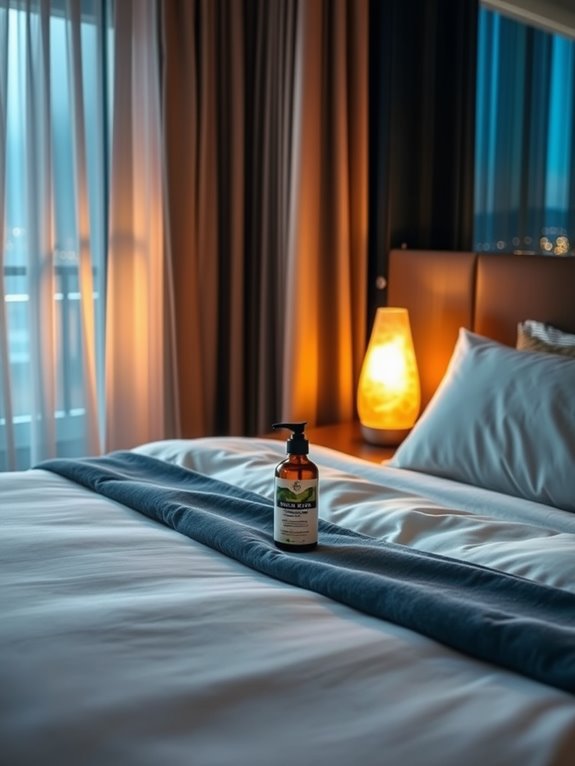
When you're trying to catch some z's on the road, sleep aids can be a game changer.
You might consider natural remedies like melatonin or herbal teas, or look into over-the-counter options for quick relief.
Just remember to use them wisely to avoid dependency and guarantee a restful night.
Natural Sleep Remedies
Although sleep aids can be tempting for a quick fix while traveling, it's essential to use natural remedies wisely to enhance your rest. Here are three effective options you can try:
- Melatonin: This hormone helps regulate your sleep-wake cycle. Taking it about 30 minutes before bedtime can help you fall asleep faster, especially in new environments.
- Herbal teas: Chamomile or valerian root teas are great choices. They've calming properties that can relax your mind and body, making it easier to drift off.
- Essential oils: Lavender oil is known for its soothing effects. Diffusing it in your room or applying it to your pillow can create a tranquil atmosphere conducive to sleep.
Utilizing these natural remedies can help you get the restorative sleep you need while on the go.
Over-the-Counter Options
Sometimes, you may need a little extra help to secure a good night's sleep while traveling, and over-the-counter sleep aids can offer that support. Options like diphenhydramine or melatonin are popular choices.
However, it's essential to use them wisely. Start with the lowest dose to see how your body reacts, and avoid using these aids nightly, as dependency can develop. Timing is also important; take them about 30 minutes before you want to sleep.
Make certain to check for any interactions with other medications you may be taking. Finally, always consult with a healthcare provider if you have concerns, especially if you're traveling for an extended period.
Prioritize a balanced approach to promote restful sleep and successful travels.
Stay Active During the Day
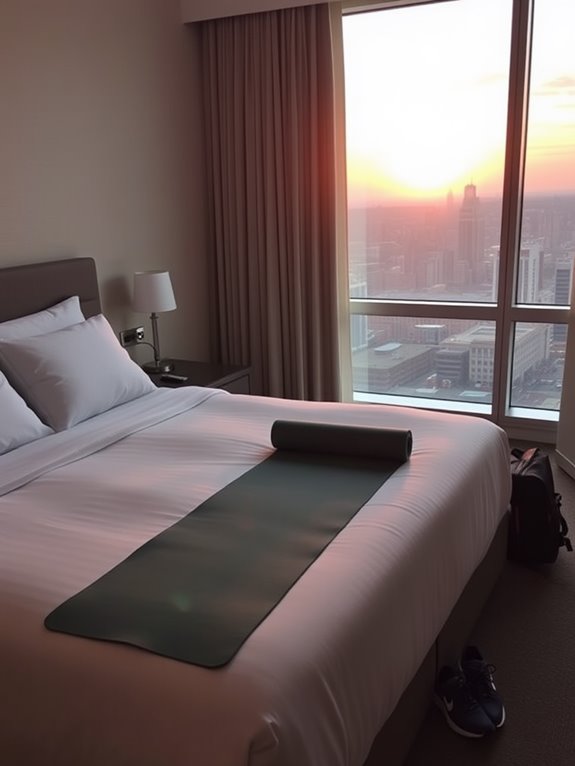
Staying active during the day can greatly enhance your sleep quality while traveling. When you engage in physical activity, you help regulate your body's sleep-wake cycle and reduce stress, making it easier to fall asleep at night.
Here are three effective ways to stay active:
- Explore on Foot: Walk or jog around your destination instead of relying solely on transportation. You'll discover hidden gems while getting your steps in.
- Use Hotel Gyms: Take advantage of hotel fitness facilities. A quick workout can boost your energy and mood.
- Join Local Classes: Participate in yoga, dance, or fitness classes. It's a fun way to stay active and connect with locals.
Manage Jet Lag Effectively
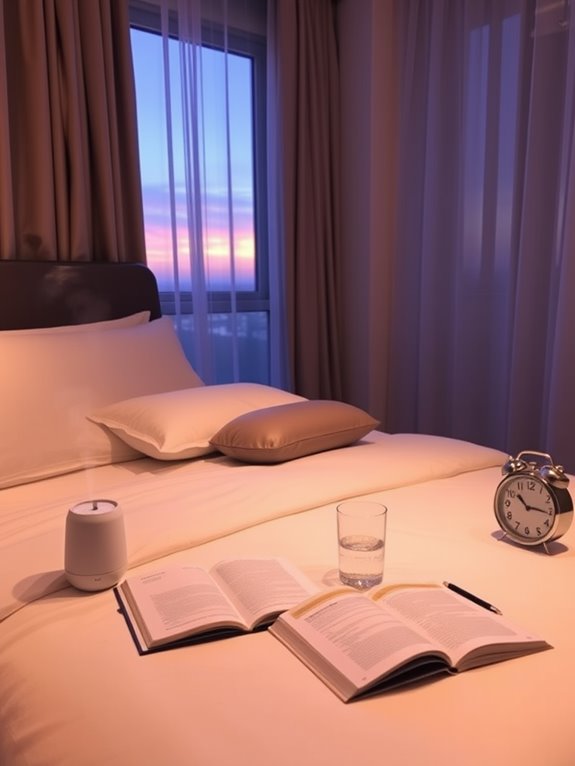
When you travel across time zones, adjusting your sleep schedule can make a big difference in how you feel.
Staying hydrated is equally important; it helps combat fatigue and keeps your body functioning well.
Let's explore some effective strategies to manage jet lag and get back on track.
Adjust Sleep Schedule
As you prepare for your trip, adjusting your sleep schedule ahead of time can greatly mitigate the effects of jet lag.
Start shifting your bedtime and wake-up time closer to your destination's time zone a few days before you leave. Here are three strategies to help you adjust:
- Gradually Change Your Schedule: Move your bedtime and wake-up time by 30 minutes each day until you match your destination's time zone.
- Use Light Exposure: Seek natural light during the day and avoid screens an hour before bedtime to signal your body when to be awake or asleep.
- Be Consistent: Stick to your adjusted schedule even on weekends to help your body adapt quickly.
These steps can make a significant difference in how quickly you adapt and how well you sleep while traveling.
Stay Hydrated Always
Hydration plays an essential role in combating the effects of jet lag, especially during travel. When you're well-hydrated, your body can adjust to new time zones more easily. Make it a habit to drink water regularly, particularly on flights and while exploring. Avoid excessive caffeine and alcohol, as they can dehydrate you and worsen fatigue.
| Hydration Tips | Benefits | Timing |
|---|---|---|
| Drink water regularly | Helps maintain energy levels | Before and during flights |
| Limit caffeine | Reduces dehydration risk | Morning only |
| Consume electrolytes | Supports fluid balance | During long travels |
Invest in Quality Sleep Gear
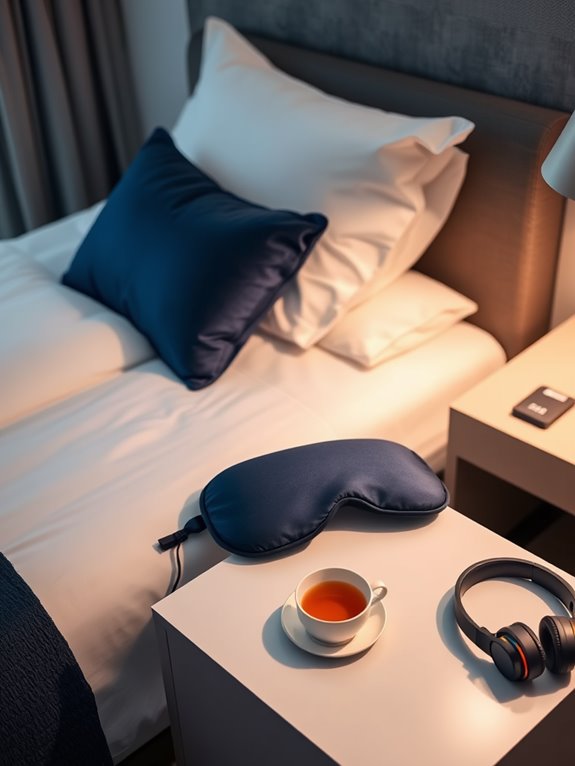
Investing in quality sleep gear can greatly enhance your rest while traveling, especially since uncomfortable beds and noisy environments often disrupt sleep.
When you're well-rested, it can support your fat loss goals as well. Here are three essential items to think about:
- Travel Pillow: A good travel pillow provides neck support, making it easier to drift off, whether on a plane or in a hotel room.
- Sleep Mask: Block out unwanted light with a sleep mask, creating a darker environment that promotes deeper sleep.
- Noise-Canceling Earplugs: These help drown out disruptive sounds, allowing you to enjoy uninterrupted rest, no matter where you are.
Investing in these items guarantees you can maximize your sleep quality while on the go.
Practice Mindfulness and Relaxation Techniques
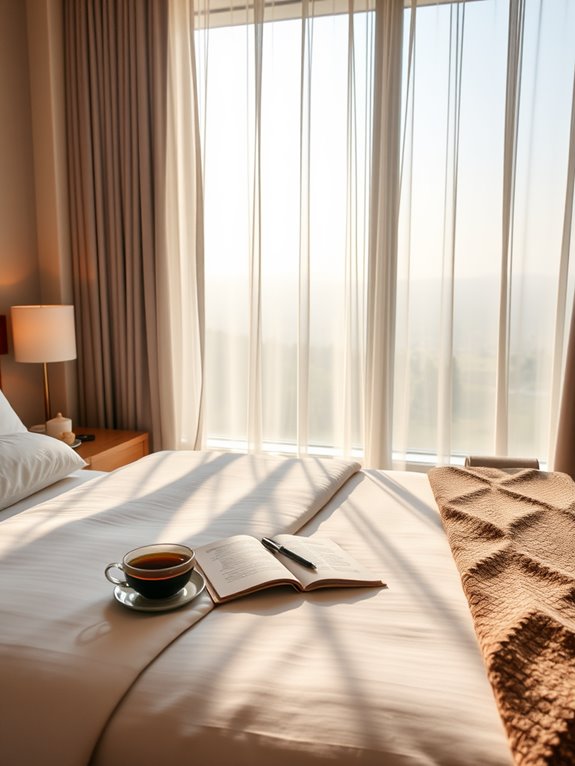
Even with quality sleep gear, you might still struggle to get a good night's rest while traveling. That's where mindfulness and relaxation techniques come in.
Try deep breathing exercises to calm your mind and body. Inhale slowly through your nose, hold for a few seconds, and exhale through your mouth.
You can also practice progressive muscle relaxation by tensing and then relaxing each muscle group, starting from your toes and working up to your head.
Consider guided meditation apps to help you focus and unwind. Additionally, visualize a peaceful scene or repeat a calming mantra to shift your thoughts away from stressors.
Frequently Asked Questions
How Does Sleep Affect My Metabolism While Traveling?
Sleep plays an essential role in your metabolism, even when you're traveling. Inadequate rest can disrupt hormonal balance, leading to increased appetite and decreased energy expenditure, ultimately making it harder for you to maintain a healthy weight.
Can Napping During the Day Hinder My Nighttime Sleep?
Yes, napping during the day can hinder your nighttime sleep. If you nap too long or too late, you might struggle to fall asleep at night, leaving you tired and groggy the next day.
What Foods Promote Better Sleep While Traveling?
Foods rich in magnesium, like almonds and spinach, can help you relax. Additionally, consider bananas and oatmeal, as they contain melatonin. Avoid caffeine and heavy meals close to bedtime to enhance your sleep quality while traveling.
Are There Specific Exercises That Improve Sleep Quality?
To improve sleep quality, focus on stretching, engage in yoga, and try deep breathing exercises. These activities relax your body, calm your mind, and set the stage for a restful night's sleep, ensuring you wake refreshed.
How Can I Manage Anxiety About Sleeping in New Places?
To manage anxiety about sleeping in new places, try deep breathing exercises, create a calming bedtime routine, and bring familiar items like a pillow or blanket. These strategies help you feel more comfortable and relaxed at night.
Conclusion
To sum up, prioritizing your sleep while traveling is as essential as packing your favorite snacks for the journey. By choosing the right accommodation, sticking to a schedule, and creating a calming routine, you'll enhance your sleep quality greatly. Don't forget to manage jet lag and stay active during the day! With these strategies, you'll not only rest better but also support your fat loss goals. Sleep well, and you'll feel energized and ready to conquer your travels!

